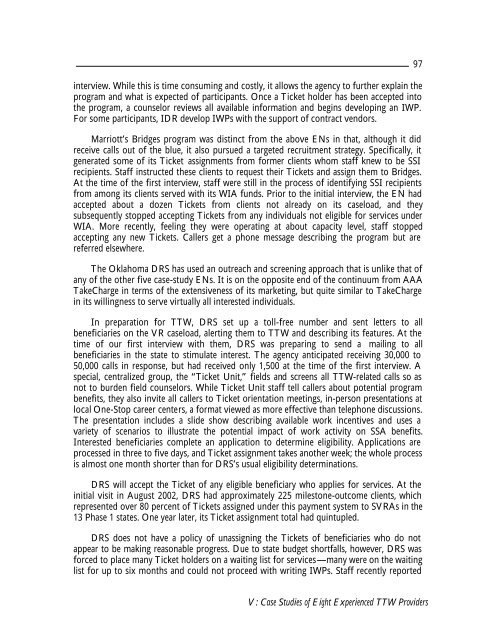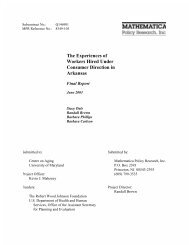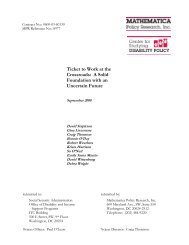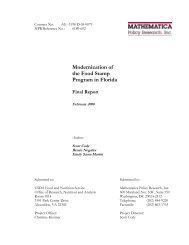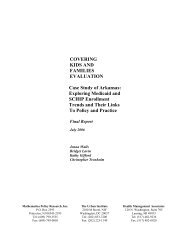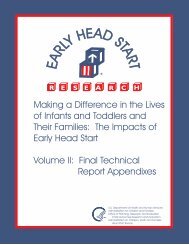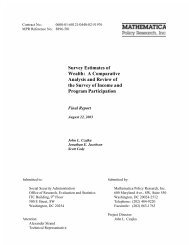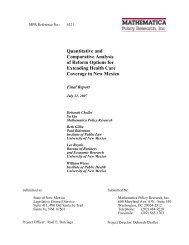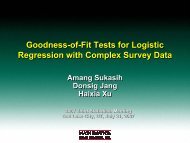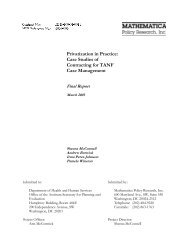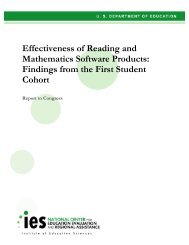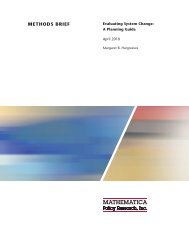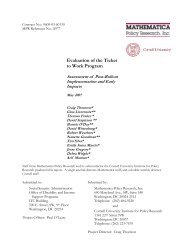Evaluation of the Ticket to Work Program Initial Evaluation Report
Evaluation of the Ticket to Work Program Initial Evaluation Report
Evaluation of the Ticket to Work Program Initial Evaluation Report
Create successful ePaper yourself
Turn your PDF publications into a flip-book with our unique Google optimized e-Paper software.
interview. While this is time consuming and costly, it allows <strong>the</strong> agency <strong>to</strong> fur<strong>the</strong>r explain <strong>the</strong><br />
program and what is expected <strong>of</strong> participants. Once a <strong>Ticket</strong> holder has been accepted in<strong>to</strong><br />
<strong>the</strong> program, a counselor reviews all available information and begins developing an IWP.<br />
For some participants, IDR develop IWPs with <strong>the</strong> support <strong>of</strong> contract vendors.<br />
Marriott’s Bridges program was distinct from <strong>the</strong> above ENs in that, although it did<br />
receive calls out <strong>of</strong> <strong>the</strong> blue, it also pursued a targeted recruitment strategy. Specifically, it<br />
generated some <strong>of</strong> its <strong>Ticket</strong> assignments from former clients whom staff knew <strong>to</strong> be SSI<br />
recipients. Staff instructed <strong>the</strong>se clients <strong>to</strong> request <strong>the</strong>ir <strong>Ticket</strong>s and assign <strong>the</strong>m <strong>to</strong> Bridges.<br />
At <strong>the</strong> time <strong>of</strong> <strong>the</strong> first interview, staff were still in <strong>the</strong> process <strong>of</strong> identifying SSI recipients<br />
from among its clients served with its WIA funds. Prior <strong>to</strong> <strong>the</strong> initial interview, <strong>the</strong> EN had<br />
accepted about a dozen <strong>Ticket</strong>s from clients not already on its caseload, and <strong>the</strong>y<br />
subsequently s<strong>to</strong>pped accepting <strong>Ticket</strong>s from any individuals not eligible for services under<br />
WIA. More recently, feeling <strong>the</strong>y were operating at about capacity level, staff s<strong>to</strong>pped<br />
accepting any new <strong>Ticket</strong>s. Callers get a phone message describing <strong>the</strong> program but are<br />
referred elsewhere.<br />
The Oklahoma DRS has used an outreach and screening approach that is unlike that <strong>of</strong><br />
any <strong>of</strong> <strong>the</strong> o<strong>the</strong>r five case-study ENs. It is on <strong>the</strong> opposite end <strong>of</strong> <strong>the</strong> continuum from AAA<br />
TakeCharge in terms <strong>of</strong> <strong>the</strong> extensiveness <strong>of</strong> its marketing, but quite similar <strong>to</strong> TakeCharge<br />
in its willingness <strong>to</strong> serve virtually all interested individuals.<br />
In preparation for TTW, DRS set up a <strong>to</strong>ll-free number and sent letters <strong>to</strong> all<br />
beneficiaries on <strong>the</strong> VR caseload, alerting <strong>the</strong>m <strong>to</strong> TTW and describing its features. At <strong>the</strong><br />
time <strong>of</strong> our first interview with <strong>the</strong>m, DRS was preparing <strong>to</strong> send a mailing <strong>to</strong> all<br />
beneficiaries in <strong>the</strong> state <strong>to</strong> stimulate interest. The agency anticipated receiving 30,000 <strong>to</strong><br />
50,000 calls in response, but had received only 1,500 at <strong>the</strong> time <strong>of</strong> <strong>the</strong> first interview. A<br />
special, centralized group, <strong>the</strong> “<strong>Ticket</strong> Unit,” fields and screens all TTW-related calls so as<br />
not <strong>to</strong> burden field counselors. While <strong>Ticket</strong> Unit staff tell callers about potential program<br />
benefits, <strong>the</strong>y also invite all callers <strong>to</strong> <strong>Ticket</strong> orientation meetings, in-person presentations at<br />
local One-S<strong>to</strong>p career centers, a format viewed as more effective than telephone discussions.<br />
The presentation includes a slide show describing available work incentives and uses a<br />
variety <strong>of</strong> scenarios <strong>to</strong> illustrate <strong>the</strong> potential impact <strong>of</strong> work activity on SSA benefits.<br />
Interested beneficiaries complete an application <strong>to</strong> determine eligibility. Applications are<br />
processed in three <strong>to</strong> five days, and <strong>Ticket</strong> assignment takes ano<strong>the</strong>r week; <strong>the</strong> whole process<br />
is almost one month shorter than for DRS’s usual eligibility determinations.<br />
DRS will accept <strong>the</strong> <strong>Ticket</strong> <strong>of</strong> any eligible beneficiary who applies for services. At <strong>the</strong><br />
initial visit in August 2002, DRS had approximately 225 miles<strong>to</strong>ne-outcome clients, which<br />
represented over 80 percent <strong>of</strong> <strong>Ticket</strong>s assigned under this payment system <strong>to</strong> SVRAs in <strong>the</strong><br />
13 Phase 1 states. One year later, its <strong>Ticket</strong> assignment <strong>to</strong>tal had quintupled.<br />
DRS does not have a policy <strong>of</strong> unassigning <strong>the</strong> <strong>Ticket</strong>s <strong>of</strong> beneficiaries who do not<br />
appear <strong>to</strong> be making reasonable progress. Due <strong>to</strong> state budget shortfalls, however, DRS was<br />
forced <strong>to</strong> place many <strong>Ticket</strong> holders on a waiting list for services—many were on <strong>the</strong> waiting<br />
list for up <strong>to</strong> six months and could not proceed with writing IWPs. Staff recently reported<br />
97<br />
V: Case Studies <strong>of</strong> Eight Experienced TTW Providers


